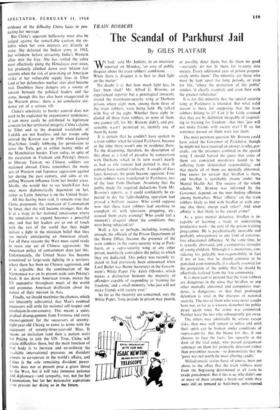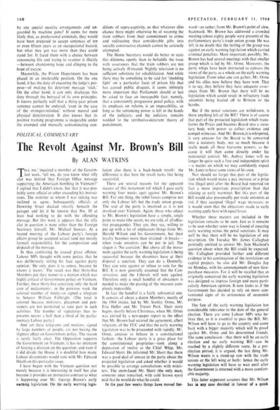TRAIN ROBBERS The Scandal of Parkhurst Jail
By GILES PLAYFAIR
Whad,' said Mr. Jenkins, in an interview reported on Monday, 'an area of public disquiet about the train robbers' conditions. . . . When there is disquiet it is best to shed light on the matter.'
No doubt it is. But how much light has, in fact, been shed? Mr. Alfred G. Browne, an experienced reporter but a penological innocent, visited the maximum-security wing at Durham prison, where eight men, among them three of the train robbers, were being held. He talked with five of the eight. Whether these eight in- cluded all three train robbers, or none of them, one cannot tell, for Mr. Browne didn't, and pre- sumably wasn't permitted to, identify any of them by name.
It is certain that he couldn't have spoken to a train robber when he visited Parkhurst, because at the time there wasn't one in residence there. To the discerning, therefore, his description of this place as a kind of paradise by comparison with Durham, which in its turn wasn't nearly as bad as vile rumour had painted it, may in context have seemed irrelevant. A couple of days later, however, the point became apparent. Four train robbers were transferred to Parkhurst, two of the four from Durham. Assuming that the public made the required deductions from Mr. Browne's reports, as it could confidently be ex- pected to do, the light-shedding operation had proved a brilliant success. Who could suppose now that these train robbers had anything to complain of, with television, pingpong, etc., assured them every evening? Who could feel a moment's disquiet about the conditions they were being subjected to?
Well, a few us perhaps, including, ironically enough, the officials of the Prison Department of the Home Office, because the presence of the train robbers in the supra-security wing at Park- hurst, or a supra-security wing at any other prison, manifestly contradicts the policy to which they are dedicated. This policy was recently re- stated (it had previously been announced when Lord Butler was Home Secretary) in the Govern- ment's White Paper The Adult (Vender, which makes a distinction between the majority of offenders capable of responding to 'training for freedom,' and a small minority 'who just will not make friends with society ever.'
So far as the majority are concerned, says the White Paper, 'long periods in prison may punish,
or possibly deter them, but do them no good —certainly do not fit them for re-entry into society. Every additional year of prison progres- sively unfits them.' The minority are those who must be kept apart for long periods, or even for life, 'where the protection of the public' renders 'it clearly essential, and even then with the greatest reluctance.'
It is for this minority that the special security wing at Parkhurst is intended. But what valid reason is there for supposing that the train robbers belong to it? Can it be fairly assumed that they are by definition incapable of respond- ing to training for freedom—that they 'just will not make friends with society ever'? If so, the sentences passed on them were too short.
The most pertinent question Mr. Browne could have asked the Governor of Parkhurst, though he might not have received an answer, is who, pre- cisely, are the prisoners confined in the special wing. I should hazard the guess that some of them are convicted murderers found to be suffering from 'diminished responsibility,' and that nearly all of them are mentally abnormal. One knows for certain that Straffen is there, and Straffen is certifiably insane under the Mental Health Act. The success of the whole scheme, Mr. Browne was informed by the Governor, depends on the men finding affinities among themselves. What 'affinity' are the train robbers likely to find with Straffen or with any- one else there, except each other? And what affinity is that likely to be, except crime?
As a gross mental defective, Straffen is in- capable of learning a trade or undertaking productive work—the core of the prison training programme. He is psychiatrically incurable and probably unresponsive to any kind of construc- tive educational influence. At the same time, he is sexually aberrated, and a compulsive strangler of young children. Although it is monstrous, con- sidering his palpable non-responsibility in fact if not in law, that he should continue to be punished even nominally, it is clearly essential for the protection of the public that he should be effectively isolated from the free community.
It is mere cant to pretend that the train robbers are dangerous in the sense that Straffen, or any other mentally abnormal and compulsive mur- derer, is dangerous: or that their prolonged detention is vital in the interests of national security. The two of them who were never caught have not, so far as is known. disturbed the public peace again since the crime was committed. Neither have the two who subsequently got away.
The others may admittedly be serious escape risks; they may well remain so unless and until their spirit can be broken under conditions of supra-captivity. But the blame for this, if one chooses to face the facts, lies squarely at the door of the trial judge, who passed gargantuan sentences on them for primarily deterrent rather than preventive reasons—to demonstrate that the 'game was not worth the most alluring candle.'
Melodramatic stories have, of course, been put about to the effect that the train robbers were from the beginning determined at all costs to evade punishment. But if this is so, why didn't one or more of them attempt a break-out while they were stilt on remand at Aylesbury, unhampered by any special security arrangements and un- guarded by machine guns? It seems far more likely that, as professional criminals, they would have been prepared to accept sentences of ten or even fifteen years as an occupational hazard, but what they got was more than they could stand for. It faced them with a choice between renouncing life and trying to re-enter it illicitly —between abandoning hope and clinging to the hope of escape.
Meanwhile, the Prison Department has been placed in an intolerable position. On the one hand, it has the duty of executing the judge's pur- pose—of making his deterrent message 'stick.' On the other hand, it can only discharge this duty through the betrayal of its own principles. It knows perfectly well that a thirty-year prison sentence cannot be endured, 'even in the case of the strongest-minded,' without mental and physical deterioration. It also knows that its positive training programme is inoperable under the cramped and mutually contaminating con-
ditions of supra-captivity, so that whatever slim chance there might otherwise be of weaning the train robbers from their commitment to crime and redirecting their considerable gifts into socially constructive channels cannot be seriously attempted.
The Home Secretary would do better to state this dilemma openly than to befuddle the issue with assurances that the train robbers are not being actively ill-treated. Nightly television is no sufficient substitute for rehabilitation. And while there may be something to be said for 'shedding light' on a particular facet of prison life that has caused public disquiet, it seems infinitely more important that Parliament should at last be asked to face an inescapable fact; namely, that a consistently progressive penal policy, with its emphasis on reform, is an impossibility, so long as the sentencing power is left in the hands of the judiciary, and the judiciary remains wedded to the retributive-deterrent theory of punishment.



































 Previous page
Previous page